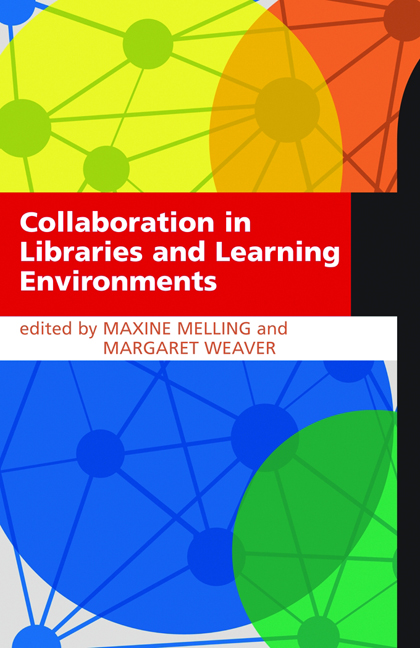Book contents
- Frontmatter
- Contents
- Contributors
- Introduction
- Abbreviations
- 1 The changing higher education context
- 2 Connecting with the student perspective
- 3 Working with professional associations
- 4 Culture, values and change: observations from three consortia in Canada
- 5 Managing complex change collaboratively
- 6 Leadership skills for collaboration: future needs and challenges
- 7 Knowing me … knowing you: the role of technology in enabling collaboration
- 8 Space: changing the boundaries
- 9 Collaborative service provision through super-convergence
- 10 Joint-use libraries and transformational change
- Index
7 - Knowing me … knowing you: the role of technology in enabling collaboration
Published online by Cambridge University Press: 08 June 2018
- Frontmatter
- Contents
- Contributors
- Introduction
- Abbreviations
- 1 The changing higher education context
- 2 Connecting with the student perspective
- 3 Working with professional associations
- 4 Culture, values and change: observations from three consortia in Canada
- 5 Managing complex change collaboratively
- 6 Leadership skills for collaboration: future needs and challenges
- 7 Knowing me … knowing you: the role of technology in enabling collaboration
- 8 Space: changing the boundaries
- 9 Collaborative service provision through super-convergence
- 10 Joint-use libraries and transformational change
- Index
Summary
Acknowledgements
The authors would like to thank all the staff who took part in the projects described below, particularly Andrew Walsh and Alison Sharman for their assistance in putting together the sections on Lemon Tree and the Roving Librarian respectively.
Introduction
This chapter uses the University of Huddersfield as an example of how technology has allowed libraries of all kinds to work more collaboratively and analyses to what extent these developments have been successful. It focuses on the broad approaches that are being used via innovative technology and rich media to both reach and understand our customers, as well as how developments in the community (e.g. open data, social media, open publishing, repositories and shared services) have enabled the sharing, use and re-use of information, data and objects:
Our job over the next five to ten years is to provide a way to access these valuable resources in an intuitive, easy to use one-stop shop, and not to be afraid of running a continual beta test where new services and functions can be added as and when necessary. To do this we need flexible, interoperable resource-discovery systems based on open source software. In addition, we must keep evaluating users’ needs and reach out by adapting our systems to fit their requirements, rather than expecting them to come to us; indeed our very future depends on it.
(Stone, 2009, 156)The chapter examines a selection of projects that have been inspired by the use of technology and social media at the University of Huddersfield in order to enrich the student experience. These projects have either been borne out of collaboration or inspired by the spirit of collaboration and sharing with others over a period of ten years (Brook et al., 2002; Stone, Ramsden and Pattern, 2011a; JISC, 2008; Sero, 2009; Pattern et al., 2010; Copac, 2012). The chapter will show the importance of both collaboration and the sharing of data and will discuss this in the context of collaboration on a national scale, for which Huddersfield's Computing and Library Services (CLS) staff have a national and international reputation.
Information
- Type
- Chapter
- Information
- Collaboration in Libraries and Learning Environments , pp. 103 - 128Publisher: FacetPrint publication year: 2012
